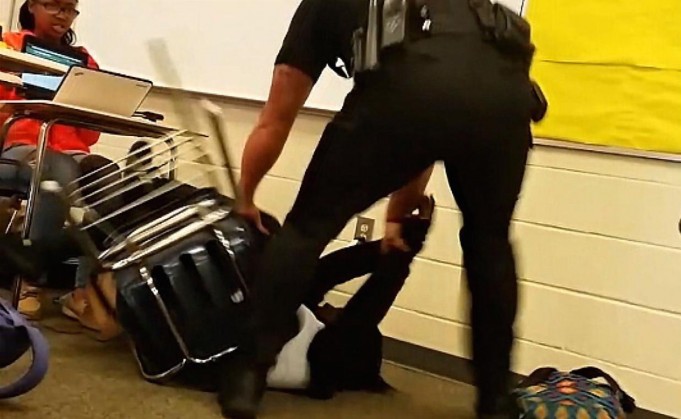Think back to when you were in school and about being a teenager, how many of you were perfect students? I bet not many, if anyone. What I mean, by perfect, is that at no time did you have a bad day. At no time did you interrupt a class or were difficult.
I know I was far from the perfect student. I slept in class. I talked back. I had my cell phone out. I wouldn’t do as I was told. How many times was our resource officer called in to deal with me? Zero. Not even the time I got in a yelling match with my teacher and kicked over a chair or when I punched another student in the middle of class. The only time our officer was called in for me was not for a behavior problem, but because another student reported that I was in possession of a controlled substance. I was quietly brought out of class by a school administrator and our school officer was waiting for me in the principal’s offices.
What is not being talked about when we talk of the assault at Spring Valley High School? That is how and why was a “resource” officer called in the first place? I’m not talking about the young girl’s behavior; I’m talking about the teacher’s behavior and that of the principal. I’m talking about how it’s a criminal offense to interrupt a classroom in South Carolina and punishment for doing so can be up to $1,000 fine and/or up to 90 days in jail. The last, and most important thing to point out, is that this violence happened to a young black women; violence against black women is invalidated far too often.
The story goes that this girl was on her cell phone and wouldn’t put it away. She was a student put recently in foster care. The teacher was upset because she wasn’t paying attention and asked her to leave the classroom. She didn’t. So the teacher called in a school administrator who again asked her to leave. She didn’t. The administrator called in the resource officer who then picked up, threw, and dragged the student across and out of the room. In doing so, he broke her arm, gave her rug burns, and possibly broke some ribs. But the mental scars are the ones that will stay with her. This was punishment not for her acting out or disturbing the class, but because she was not blindly obedient. The student said she didn’t leave the classroom because she felt it was unfair punishment and had already put her cell phone away.
Imagine if that was you, your sister, your daughter, your girlfriend, your friend, etc.
There are some key things here. She had her cell phone out, which was her not paying attention, and it was not “causing a disturbance.” It wasn’t until the teacher stopped teaching to tell her to put it away and leave. The disturbance continued when the teacher continued to not teach and bring in the school administrator. The disturbance further continued when the administrator called in the officer. The disturbances continued when he assaulted her, scaring her and her classmates. Did you know what happened when I had my cell phone out once? The teacher took it out of my hands and set it next to her. She did this all without having to stop teaching.
There are so many ways that a student not paying attention could be addressed. It could be ignoring the student having her cell out and talking with her after class. It could be taking her cell phone away. The teacher could have continued to teach after the student put her cell phone away, and again talked to the student after class. This couldn’t have been the first student that had their cell phone out for this teacher. I’d like to know how many other students he stopped the class for. How many other students did he try and remove from the classroom for having their cell phone out?
Black girls are just as much a part of the school-to-prison pipeline as black boys. Black girls are six times as likely to be suspended as white girls. When we see “behavior” problems in white students, they get their parents/guardians called, they get talked to after class, and they get chances to learn and grow. Just like they do in life. For many reasons, some socioeconomic and others structural, they get counseling and medication for more severe behavior problems.
Black students get suspended. They get labeled with an IEP (Individualized Education Program) and grouped in the same class, and they get arrested in school. Now, in South Carolina, the very act of being a moody teenager can be deemed a criminal offense that could land you in jail. This is also the case when it comes to some cities and truancy. Opportunity and chances are offered to white students when it is taken away from black students.
Don’t think the events that lead to that girl being assaulted can’t happen here in Madison, either. One in three black youth have been arrested in Madison. Madison has one of the largest education gaps in the nation, and it has a disproportionate suspension and expulsion rate. Madison takes part in the criminalization of living young and black, and especially in poverty. Poverty itself can cause behavior problems, as it’s a traumatic experience. Being black is also a traumatic experience. There are other causes of in-class “behavior” problems, such as not understanding the material and many any other reasons. Very few demand a police officer, let alone ripping someone from a chair that was just sitting there.
Students bring their outside lives into the classroom and it’s unreasonable for us to expect they leave it at the door. Being a teenager is tough enough, but a black girl is especially hard for so many reasons. Your body, as we saw in McKinney and now at Spring Valley, can be stolen from you at any moment from those that are supposed to protect you … by those who are supposed to help you learn and grow … at a space that is supposed to be safe. One bad moment is all it takes; just ask Sandra Bland. It’s often a silent, unnoticed pain and one that we must recognize. We have a My Brother’s Keeper, but not a My Sister’s Keeper. We talk about violence of police officers against black men, but not black women. When we talk of incarceration we talk of black men, not black women.
It is more than irresponsible for us to look at this as an isolated incident because violence against black students — especially black girls — goes ignored. The damage that our schools are having on our students is very real. Like the rest of Madison, our school district is scared to attack its racism with the needed vigor. Madison school district: keep your hands off our young black women, keep them in the classroom.










